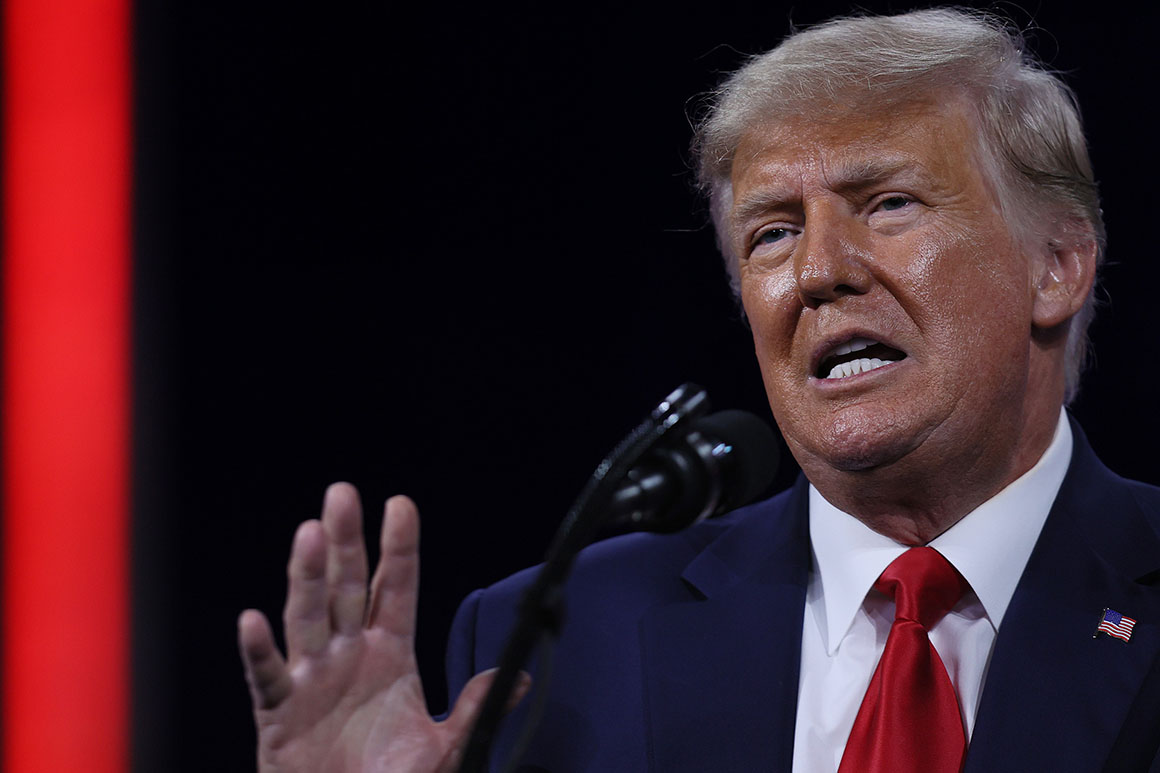Technically they belong to the same party. But on a growing number of issues, House and Senate Republicans might as well live on different political planets.
And much of the intraparty strain revolves around the aftermath of Donald Trump’s presidency.
The Senate GOP is firmly behind Alaskan Lisa Murkowski’s reelection bid even after she voted to convict the former president of inciting an insurrection. But across the Capitol, House Republicans are largely leaving Ohio Rep. Anthony Gonzalez on his own following his impeachment vote as Trump endorses his primary challenger.
Even that division goes deeper than Trump, with the National Republican Senatorial Committee largely backing incumbents while the National Republican Congressional Committee doesn’t get involved in primary races. But Trump has magnified that disagreement over whether to defend embattled incumbents by vowing to exact revenge against Republicans who have crossed him.
Hugging Trump has become priority number one for most House Republicans, with feting the former president in Mar-a-Lago becoming a rite of passage among their leaders. GOP senators, by contrast, are trying to chart a different path forward — one built on policy rather than Trump’s personality — figuring that will make their party’s brand more effective than attaching itself to one man. Don’t expect Mitch McConnell to show up in Florida any time soon.
“It’s important that we not be a personality-based party,” said Senate Minority Whip John Thune (R-S.D.), who has urged his party to move on from Trump, at least in the short term. “Durability as a political party is based around a set of ideas.”
Retorted Rep. Mo Brooks (R-Ala.), who is mulling a Senate run in Alabama and led challenges to the election on Jan. 6: “Our more liberal, establishment brethren in the Senate have not been faring very well. Those were the only ones that lost in 2020.”
The emerging schism is bigger than House and Senate Republicans’ increasingly divergent approaches to the former president since his loss to Biden and his second impeachment. House and Senate Republicans are taking divergent stances toward President Joe Biden and some of his priorities, even as they unite in opposition to his coronavirus bill.
Even before Biden’s inauguration, the House-Senate GOP split was beginning to unfold. More than 100 House Republicans signed an amicus brief in support of throwing out November’s election results as Trump pushed a baseless narrative of voter fraud, and a similar number challenged the certification of the election. In the Senate, no one supported the brief and just eight GOP senators challenged Biden’s election in Congress.
Veterans of both chambers chalk it up to the disparate effects of the House’s two-year terms in gerrymandered districts and the Senate’s statewide electorates and staggered six-year terms. Those factors are exacerbated by the hyper-loyalty demanded by Trump and his hardcore supporters, as well as the fact that the Senate GOP needs to win Senate races in swing states like Nevada, Arizona, New Hampshire and Pennsylvania next year.
“What it takes to win in a general election in many Senate seats is just different. It’s a more diverse electorate. Ours tend to be more homogeneous,” said Rep. Tom Cole (R-Okla.), former head of the NRCC.
“The House is more sensitive to the immediate situation. And the Senate sort of takes a little bit of the longer view,” said Sen. John Cornyn (R-Texas), a former chair of the NRSC.
Republicans have found at least one area where they can rally together in the post-Trump era: countering the more liberal elements of the Biden agenda. But they got there from different places, as Senate Republicans actually met with Biden to see if they could work together just a few weeks ago.
In addition to the Covid relief package, the GOP is expected to mostly stay united in its opposition to Democratic legislation on LGBTQ rights, election laws and police reform.
But beneath the surface of that unity lies more discord, including some over Biden-backed goals. Senate Republicans are open to cutting a deal on raising the minimum wage and are warmer toward earmarks, in addition to some presidential nominees, than House Republicans would like. House Republicans are mulling taking a strong position against earmarks and have little interest in raising the minimum wage, one of the hottest debates in Washington right now.
“You will always have a handful of Republicans that vote to raise the minimum wage, but it’s only a handful,” said Rep. Patrick McHenry (R-N.C.), noting that more House GOP members tend to live in districts where the cost of living is cheaper. “Broadly speaking, there is belief among Republicans we shouldn’t get into this on the federal level.”
Senate Minority Leader Mitch McConnell said Tuesday that raising the minimum wage is “worth discussing.” He also dryly dismissed Trump’s suggestion that the former president propelled McConnell to his reelection in 2020: “I want to thank him for the 15-point margin I had in 2014 as well.”
And when it comes to his incumbent who voted against Trump during the impeachment trial, McConnell said in a recent interview that “Absolutely, we’re all behind Sen. Murkowski.”
McConnell’s counterpart in the House, Minority Leader Kevin McCarthy, has declined to answer repeated questions about whether he thinks the GOP should defend incumbents like Gonzalez who voted to impeach Trump.
Gonzalez, however, seemed unruffled by the likely lack of help from his party: “I’m going to run my race,” he said. “I don’t worry about what other people do.”
McCarthy also wouldn’t say whether he would help the reelection campaign of his deputy, GOP Conference Chair Liz Cheney, whose vote to remove Trump from office has helped draw a primary challenge: “Liz hasn’t asked me" to step in, he said.
While McCarthy holds off, McConnell has gone out of his way to defend Cheney — even though she’s a House member and there’s no Senate race in Wyoming this cycle.
The House GOP’s campaign arm has historically not gotten involved in primary races, even on behalf of dues-paying incumbents. The thinking is that it could create bad blood if they pick the wrong candidate. (In recent years, though, some rank-and-file Republicans have grown more comfortable playing in primaries, while leaders and other members have intervened in open races to help elect more women and minorities.)
NRSC Chair Rick Scott (R-Fla.) said he only learned this week that House Republicans don’t have the same policy of protecting incumbents. He said since the NRSC asks Republicans to all pitch in, “we ought to be helping people that are our colleagues.”
As he walked to a Republican lunch Tuesday, Sen. Kevin Cramer (R-N.D.) reflected on the cultural differences between senators and House members. Nowadays in the Senate, he has lunch with his 49 colleagues three times a week. As a three-term House member, Cramer remembered being jammed in a room with 200 of his colleagues, eating his breakfast on his lap and waiting for his turn to speak for a minute.
He said the distinctions between those party meetings explain a lot about the divide between the two GOP conferences.
“That’s just not conducive to big problem solving,” he said of rowdy House conference meetings. “So you’re driven more to populism, quite honestly.”





















